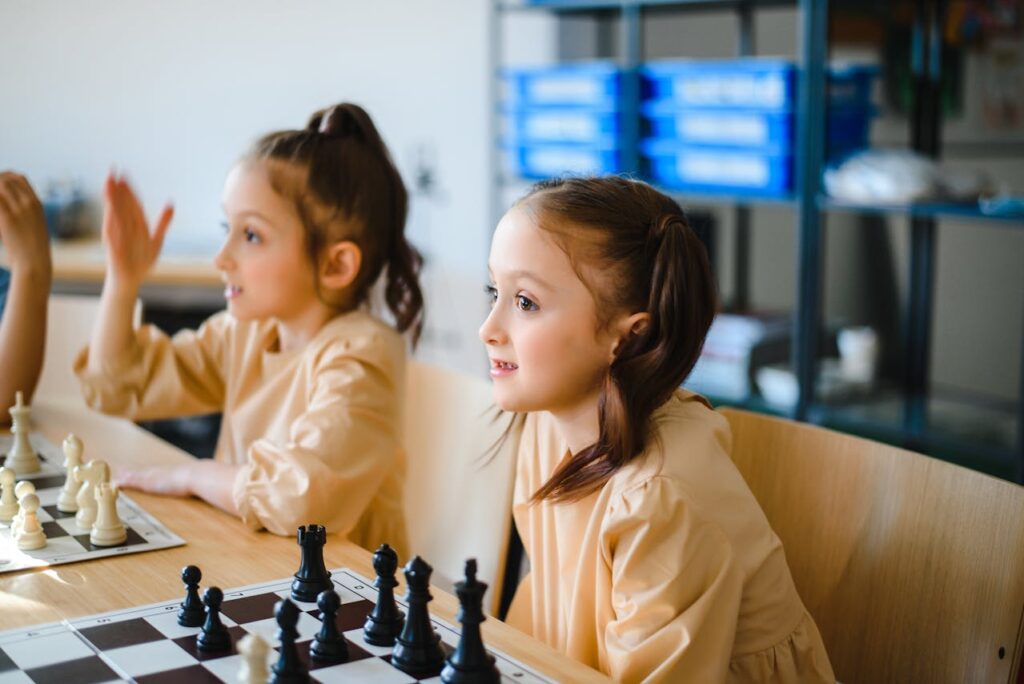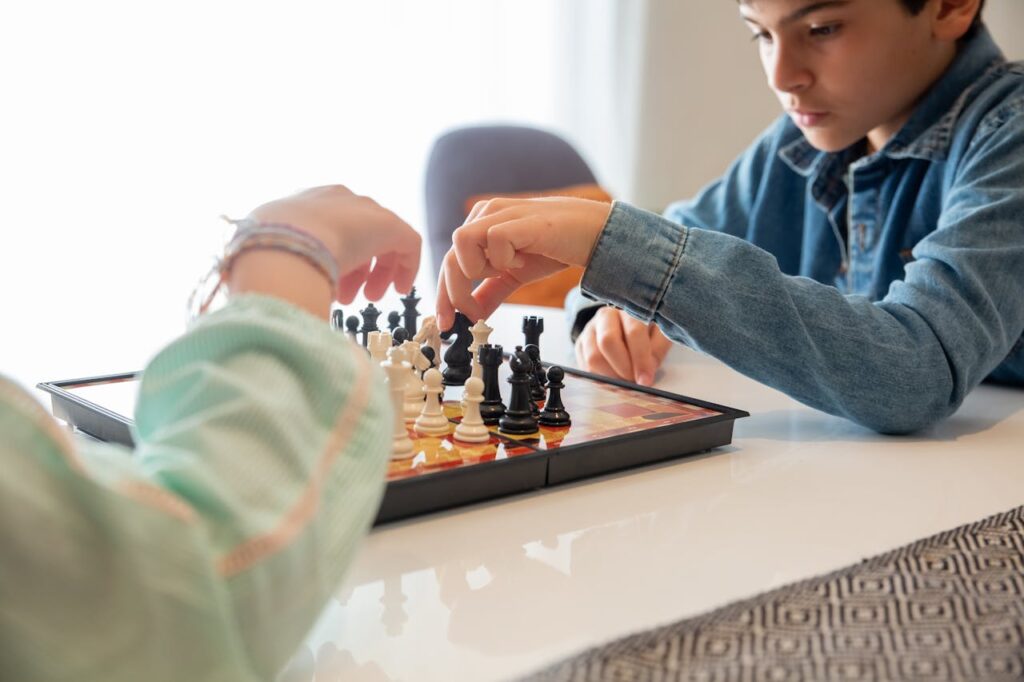Mental toughness is one of the most valuable skills a child or adult can develop. It’s the ability to handle stress, face challenges head-on, and keep moving forward even when things get difficult. Surprisingly, one of the best ways to build mental toughness isn’t through physical exercise or difficult academic challenges—it’s through the game of chess.
Chess teaches resilience in a unique way. As players face wins, losses, and countless complex situations, they learn to adapt, bounce back from setbacks, and stay focused under pressure. The mental workout that chess provides helps shape a player’s ability to handle difficult situations, not just on the board, but in everyday life as well.
Learning to Cope with Failure: A Core Lesson in Mental Toughness
One of the first lessons chess teaches players is how to deal with failure. In every game, there are mistakes—small ones that might set you back a few moves and bigger ones that can cost you the game entirely.
Losing is an inevitable part of playing chess, especially when you’re learning. But every loss comes with an opportunity to grow and improve. This mindset is crucial for developing mental toughness.
Embracing Mistakes as Learning Tools
In chess, mistakes aren’t just inevitable—they’re essential to improving.
Every time a player makes an error, whether it’s losing a piece or misjudging an opponent’s strategy, they have the chance to analyze their mistake and learn from it.
This process helps players develop resilience, as they learn that setbacks are not final, but rather stepping stones on the way to becoming better.
For example, a child playing chess might fall into a simple trap and lose their queen early in the game. At first, they might feel frustrated or even embarrassed.
But as they continue to play, they’ll realize that these mistakes are a valuable part of their learning journey.
By reviewing their games afterward—whether on their own or with a coach—they can figure out exactly where things went wrong and avoid making the same mistake in the future.

Handling Disappointment with Grace
In chess, you won’t win every game. Some losses come after a hard-fought battle, while others happen quickly due to a single misstep.
But in either case, chess teaches players how to handle disappointment without letting it derail their progress.
For example, a young player might spend weeks preparing for a tournament, only to be eliminated in the early rounds.
While this can be disappointing, chess encourages players to view these experiences as temporary and not defining.
Rather than getting stuck on the loss, players are taught to focus on what they can control: their own effort, attitude, and the lessons they can take from each experience.
Staying Calm Under Pressure: A Chess Player’s Secret Weapon
Another major component of mental toughness is the ability to stay calm in high-pressure situations. Chess is a game that often creates intense moments, especially in competitive matches.
Whether you’re running out of time on the clock or facing a strong attack from your opponent, maintaining composure is critical to making good decisions.
Managing Stressful Moments
In a chess game, especially one with time controls, players are frequently put in stressful situations where they have to make decisions quickly and carefully.
Imagine a scenario where a player has only 30 seconds left on the clock to make their next move, and their opponent is launching an attack on their king.
The pressure to make the right move can be intense, but chess teaches players how to manage this stress effectively.
By regularly encountering these high-pressure moments, players learn how to slow down their thinking, focus on the essentials, and make decisions based on logic rather than emotion.
This ability to stay calm and collected during stressful situations is a key aspect of mental toughness.
Practicing Patience and Delayed Gratification
In chess, rushing rarely leads to success. Players who act too quickly, without carefully considering their moves, often find themselves making mistakes.
Chess requires patience—sometimes, it takes several moves to execute a strategy or set up a winning attack.
This ability to wait for the right moment, rather than acting impulsively, is another important aspect of mental toughness.

For example, a player might see an opportunity to capture an opponent’s piece, but rushing to do so could leave their own position vulnerable.
Instead of acting immediately, a seasoned player will carefully evaluate the risks and benefits before making a move.
This teaches players the value of waiting for the right opportunity, even when it’s tempting to act quickly.
Building Emotional Control: Managing Frustration and Staying Focused
Frustration is a natural part of playing chess. Every player, no matter how skilled, experiences moments where they miss an opportunity, make a mistake, or fall behind in a game.
But chess also teaches players how to manage that frustration and remain focused on their goals.
Learning to Let Go of Mistakes
One of the hardest things for chess players, especially beginners, is learning how to move on from a mistake.
It’s easy to get stuck thinking about that one move you wish you could take back. However, chess teaches players that holding onto past mistakes only hurts your future performance.
Instead of dwelling on what went wrong, successful players learn to let it go and focus on the present position.
For example, a child might lose their rook to an unexpected attack.
While it’s natural to feel upset about the mistake, continuing to think about it can distract them from making strong moves in the rest of the game.
Chess helps players build the mental discipline to acknowledge their mistakes, learn from them, and move forward without letting frustration cloud their judgment.
Staying Focused Through Distractions
Another major lesson chess teaches is the importance of focus. In a game, it’s easy to get distracted by your opponent’s moves, the clock, or even your own thoughts about how the game is going.
But to succeed, players must stay completely focused on the board and the task at hand.
For example, in a tournament setting, there might be noise from other players or tension in the room as the clock ticks down.
A strong chess player learns how to block out these distractions and concentrate fully on their strategy. This ability to stay focused, even in the face of external pressures, is a key part of mental toughness.
Decision-Making Under Pressure: The Heart of Mental Toughness
One of the most valuable skills chess teaches is the ability to make sound decisions under pressure. Every move in a chess game is a decision, and as the game progresses, the pressure increases.
The beauty of chess lies in the fact that you can’t predict everything—your opponent’s moves, their style, or how they might respond to your plans.
Evaluating Risks and Rewards
In chess, not every decision is straightforward. Players must frequently evaluate the risks and rewards of a given move.
These choices require careful calculation and strategic thinking. Players who make decisions too quickly may miss important details, while those who overthink risk running out of time.
This balancing act between caution and decisiveness builds a critical aspect of mental toughness: the ability to stay calm under pressure and trust your own judgment.
For example, a player might be running low on time but needs to decide whether to launch a risky attack or defend a vulnerable position.
Chess teaches players to weigh these options carefully, make a choice, and then commit to it with confidence.
Learning to Accept Uncertainty
One of the challenges chess players face is that they can never fully know what their opponent will do next.
Even if you plan your moves meticulously, your opponent’s unexpected choices can throw your strategy off course.
This teaches players an important lesson: uncertainty is part of the game, and part of life. Learning to accept and manage uncertainty is a key aspect of mental toughness.

For example, you may have set up a perfect attack on your opponent’s king, only for them to make a move you didn’t anticipate, forcing you to abandon your plan and rethink your strategy.
Instead of panicking, skilled chess players learn to adapt to new situations, reevaluate the board, and come up with a new approach.
This ability to stay flexible and adaptable in the face of uncertainty is crucial not only in chess but also in life.
Chess Builds Confidence Through Consistency
Mental toughness is closely tied to self-confidence. The more confident we are in our abilities, the more resilient we become when facing challenges.
Chess is a game where confidence is built gradually, one move at a time. Players start with small victories—learning an opening, mastering a tactic, winning a game—and these successes add up over time.
Seeing Progress Over Time
Chess is a game of progress. At first, players might struggle to understand basic strategies, but as they continue to play, they begin to see the fruits of their labor.
They start winning more games, recognizing patterns faster, and making smarter decisions.
This tangible improvement builds confidence, as players realize that they are capable of mastering difficult skills through practice and persistence.
For example, a child who starts out losing most of their games might feel discouraged at first.
But with regular practice, they begin to notice that they can hold their own against stronger opponents.
Each win, each solved puzzle, and each hard-fought game adds to their sense of accomplishment, helping them believe in their abilities.
Taking Calculated Risks
As players become more confident in their abilities, they also become more comfortable taking calculated risks. In chess, not every game can be won by playing it safe.
Sometimes, players must take bold actions, such as launching an aggressive attack or sacrificing a piece, to gain an advantage.
Learning to take these risks strategically, rather than recklessly, is a key part of building mental toughness.
For example, a player might see an opportunity to sacrifice a bishop in exchange for breaking through their opponent’s defense.
While this move comes with risks, a confident player understands the potential benefits and is willing to take that chance if they believe it will lead to a better position.
In life, taking calculated risks is often necessary for growth. Whether it’s applying for a challenging job, starting a new project, or trying something outside your comfort zone, the ability to assess risks and take bold actions is essential for success.
Chess teaches players that taking risks isn’t about acting impulsively—it’s about making informed decisions with the confidence to see them through.
Mental Endurance: Staying Focused Through Long Games
Chess is not a sprint; it’s a marathon. Some games can last for hours, and the mental endurance required to stay focused, alert, and strategic throughout is immense.
This extended mental workout helps build resilience, teaching players how to maintain concentration and clarity even when they’re tired, frustrated, or under pressure.
Fighting Mental Fatigue
One of the biggest challenges in chess is fighting mental fatigue, especially in long games where players have to stay sharp for extended periods.
As the game drags on, it’s easy to lose focus, make hasty decisions, or fall into a defensive mindset.
However, strong players learn how to pace themselves mentally, conserving their energy and staying focused on their goals, even when the game feels exhausting.

For example, in a tournament game that stretches into its third hour, both players may feel mentally drained, but the player who can maintain their focus and continue making thoughtful decisions is often the one who comes out on top.
This ability to fight through mental fatigue is a crucial aspect of mental toughness.
In life, mental endurance is necessary for handling long-term challenges, whether it’s pursuing an educational goal, managing a career, or maintaining healthy relationships.
Staying Disciplined and Consistent
Chess rewards discipline. To succeed, players must stick to their strategy, remain consistent in their decision-making, and resist the urge to make impulsive moves.
This disciplined approach to the game translates into other areas of life, teaching players that success often comes from staying the course, even when it’s tempting to give up or take shortcuts.
For example, a player might be in a position where they feel tempted to launch a risky attack, but their strategy calls for a more patient, defensive approach.
By staying disciplined and sticking to their plan, they avoid unnecessary risks and set themselves up for success later in the game.
In real life, discipline is essential for achieving long-term goals. Whether it’s studying for exams, building a career, or maintaining healthy habits, staying consistent and following through on plans is a key part of mental toughness.
Chess and Social Skills: Building Connections Through Competition
Chess might seem like a solo activity, but it’s a game that fosters connection, communication, and collaboration.
Whether played in a quiet setting between two friends or in a bustling tournament hall, chess brings people together, encouraging interaction and the development of important social skills.
Respecting Opponents and Good Sportsmanship
One of the most important social lessons chess teaches is respect for your opponent. In chess, you win some games and lose others.
Regardless of the outcome, players are encouraged to show respect and good sportsmanship. This creates a culture of mutual respect, where opponents can learn from each other and grow as players.
For example, after a game, players often review the match together, discussing key moves and strategies.
This post-game analysis isn’t just a way to improve—it’s also an opportunity to build relationships and learn from one another.
Players respect each other’s abilities and approach the game with humility, knowing that every game offers something new to learn.
Building Confidence in Social Settings
For many players, chess is a gateway to building social confidence.
Whether in casual games at school, local clubs, or competitive tournaments, chess creates opportunities for players to engage with others, share ideas, and test their skills in a supportive environment.
For example, a shy child who may not feel confident speaking up in class might find a sense of belonging and self-assurance in a chess club.

As they play more games and experience small victories, their confidence grows—not just in their chess ability, but in their ability to interact with others in social settings.
Chess and Emotional Intelligence: Developing Empathy and Self-Awareness
While chess is known for sharpening the mind and building resilience, it also plays a critical role in enhancing emotional intelligence (EQ).
Emotional intelligence is the ability to understand and manage emotions—both your own and those of others.
Understanding Your Emotions During a Game
Chess is an emotional game. Players experience highs and lows, moments of excitement and frustration, and the thrill of victory or the sting of defeat.
These emotions are a natural part of the game, but how players manage these feelings determines their success.
For instance, losing a key piece can lead to feelings of disappointment or frustration, but players who can regulate their emotions stay focused on the game and look for ways to bounce back.
Chess teaches players to recognize their emotions, acknowledge them, and then shift their attention to problem-solving.
This process builds self-awareness, which is one of the core components of emotional intelligence.
Building Empathy by Understanding Others’ Perspectives
Empathy is the ability to understand and share the feelings of another person. While chess may seem like a solitary game, it’s deeply rooted in understanding your opponent’s thoughts and emotions.
To succeed, players must anticipate their opponent’s moves and think about the game from their perspective.
This constant mental exercise helps players build empathy by learning how to see the world through someone else’s eyes.
This skill is invaluable in social situations. Whether it’s resolving a conflict, working in a team, or simply connecting with others on a deeper level, the ability to understand someone else’s perspective is crucial for building strong relationships.
Chess helps players develop this skill by constantly challenging them to think beyond their own needs and consider the other person’s strategy, emotions, and intentions.
Conclusion
Chess isn’t just a game of strategy—it’s a powerful tool for building mental toughness and resilience.
Through its challenges, players learn to cope with failure, stay calm under pressure, make thoughtful decisions, and push through mental fatigue.
Chess teaches that success doesn’t come from avoiding mistakes, but from learning how to recover from them and keep moving forward.
It shows players how to stay disciplined, patient, and focused, even when the journey is difficult.
For parents, teachers, and coaches, encouraging children to play chess can have a lasting impact on their mental and emotional development.
The lessons learned on the chessboard—handling setbacks, staying calm, and thinking strategically—prepare kids for challenges in school, work, and personal life.
READ NEXT:
- Chess for Adults: A Fun Way to Boost Mental Acuity
- How Chess Helps Kids Master the Art of Planning
- Chess for ADHD: Helping Kids Focus
- Understanding Pawn Structure: The Backbone of Chess Strategy
- How to Avoid Blunders in Chess: Tips for Beginners
- How Chess Enhances Concentration and Focus in Adulthood
- The Science Behind Chess and Improved Decision-Making for Adults

